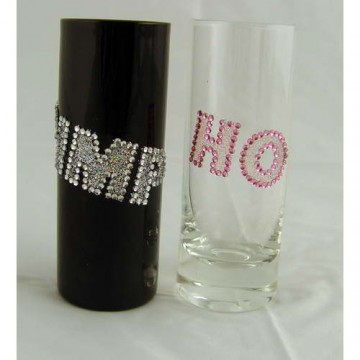Pimp Cups and the Great American Disconnect
While lawyer Bridget Carr stood in the checkout line waiting to purchase some early Christmas products, she noticed some rhinestone studded cups labeled “pimp” and “ho” displayed near the register.
Some people would’ve laughed at the sight, either at the slang connotations of the terms or maybe at the fact there is a market for this sort of bedazzled tableware. But Carr couldn’t swallow it.
She set her stuff down on the counter and walked out.
It wasn’t because she was a Christian, a conservative or a fundamentalist. Maybe she was or wasn’t any of those things, I don’t know.
It was because even though she graduated from Notre Dame and then Univeristy of Michigan’s law school, she never built a wall to separate herself or “her people” from those victimized by slavery and sex trafficking.
Carr’s parting words to the store clerk? “If you knew what the reality was like, especially for young girls who are being exploited, I don’t think your company would be supporting that.”
How was Carr able to even remember there ARE hurting people, as she rushed about her shopping in middle class America?
Why did their reality, mainly in other parts of the world or in underground rings in the U.S.,come to mind as she saw some cheesy products displayed at the checkout counter?
It’s because Carr knew some of the people involved.
Carr worked with immigrants and refugees in Americorps for two years and later went on to work with asylum seekers in Detroit’s Freedom House. As a lawyer, she’s also consulted on specialty cases surrounding issues like Ukranian teens forced to work in Detroit-area strip clubs.
Now at 34, Carr, a law professor at the University of Michigan, runs the nation’s only law clinic devoted to fighting human trafficking.
Most people, Carr realizes–however–live isolated from the plight of modern day slaves. “When you hear that the same site where you bought your baby’s crib is also selling 12-year-olds for sale, that stimulates outrage,” she says. But once Craigslist eliminated or censored that category of ads, and that industry is no longer slapping people in the face, Carr says “it removes the average person from that experience; they say ‘I have no connection to that.’ ”
But Carr does not allow herself that kind of disconnect.
Who she knows, and has learned to love, alters the way she sees hurting populations across the world…to the point where she can’t stomach a bejeweled pimp cup by a register without seeing real humans ripped away from their homes and brokered in slavery.
Whether we boycott stores that carry products like this or not, I have to think Carr has the right idea too. The world would be a better place if we held onto some important connections–and let the suffering of the third world penetrate our illusions of isolation in the first.
~This story is based on a retelling of an article from USA Today



Ben Arment November 18, 2010 (7:59 am)
Sarah, your blog posts belong in the New Yorker magazine. Thanks for the thoughtful and intriguing writing.
Misty Fagan November 18, 2010 (8:22 am)
Thank you for sharing this story. It is something we all need to hear.
Travis Mamone November 18, 2010 (9:10 am)
I never understood why being a “pimp” and a “ho” is so glamorous nowadays. Once you think about, the message we’re sending is, “Girls are nothing but sluts, and guys are free to smack them around.”